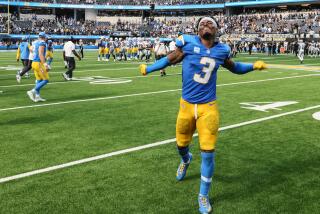Raiders, NFL Keep Arguing Before Case Goes to the Jury
- Share via
Sock it to the NFL, a lawyer for the Oakland Raiders urged a Los Angeles Superior Court jury Friday.
Deny the Raiders, a league attorney countered. Give them nothing.
Seven weeks after it began, the Raiders’ suit against the league wrapped up Friday, the case now going to an eight-man, four-woman jury to decide whether the league interfered with a 1995 proposal to build a stadium at Hollywood Park. Deliberations begin Monday.
The Raiders say the league sabotaged the deal, forcing them back to Oakland, their original city. The Raiders, who played in Los Angeles from 1982 to 1994, also contend they still own the L.A. market for NFL football. The team is seeking more than $1 billion in actual damages, as well as punitive damages.
“There’s got to be some message sent to the NFL that people are treated all the same, that they treat all teams the same,” Raider attorney Joseph M. Alioto said.
The league denies any wrongdoing, and NFL attorney Allen Ruby argued Friday to the jury that the league acted “honorably” and “faithfully” in what was “a complicated business deal.” He urged jurors to return a “just and lawful verdict.”
He contended that the Raiders simply got “a better deal” in Oakland, one that offered $53.9 million in up-front money, and took it.
The Oakland deal was so much better, Ruby said, that it was “a no-brainer.” He added of the Raiders, “They come into court now and say, ‘We wanted Hollywood Park.’ That’s so wrong.”
Put yourself, Ruby suggested, in the place of Raider owner Al Davis, who in the spring of 1995 was involved in talks with both Hollywood Park and Oakland: “What are you going to do? You do what the Raiders did, which is leverage the deals against each other. You get the very best deal you could.
“And then,” Ruby said, “go to Oakland.”
Davis, sitting in the front row of the courtroom, laughed out loud when Ruby declared that Oakland was the “better deal.”
Alioto, as he has done throughout the trial, said that the team returned to Oakland after the NFL insisted on an option agreement for a second team at Hollywood Park--and then, in the second week of June 1995, worked the language of the option to allow for the possibility of the second team beginning play at the same time as the Raiders.
That change culminated a three-week process that began with the NFL offering the Raiders one Super Bowl at the site but making a second Super Bowl conditional on the possibility of the second team. The Raiders say Hollywood Park needed two Super Bowls to make the deal work.
“They knew they were killing the deal,” Alioto said of the NFL. “That’s what that was all about.”
Ruby said that even with one Super Bowl, the Hollywood Park deal was the best the NFL had ever offered any team, “more offered to them on a platter than any team in the NFL, before or since.”
“That’s baloney,” Alioto countered. In 1994, he argued, “the commissioner was talking about five Super Bowls in 10 years.” He went on to label what happened the “Hollywood Park fiasco.”
The arguments also went back and forth on what may turn out to be the key emotional component in the case--the Raiders’ claim that the NFL treats them different from any other team in the league.
Such “discrimination,” as the Raiders see it, is rooted in a 1980s lawsuit, won by the Raiders, that set the stage for the franchise to move to Los Angeles.
All these years later, Alioto said, referring to NFL officials and to Davis, “I can’t believe they would still have that kind of feeling about the man. But they do--the powerful ones.”
Ruby maintained that discrimination against the Raiders is “nonexistent” and said, “It’s a false and shameful allegation to make.”
The 1980s lawsuit also explains the Raiders’ claim to the L.A. market. In that case, the Raiders won $35 million. A few years later, when with interest the judgment was worth $64 million, the sides settled for $18 million. The Raiders say they “paid” $46 million for the Los Angeles market. The league calls it a “settlement,” not a payment.
Alioto got in the last word Friday--speaking for a little over an hour after Ruby had held the stage for most of the day--and said in wrapping up that what had happened to the Raiders was “stunning and shocking.”
But it was Ruby who framed perhaps the central question that underlies the decision now confronting jurors. He asked, “Who do you think was really sincere in this transaction, and who was not?”
*
Times staff writer Eric Stephens contributed to this story.
More to Read
Go beyond the scoreboard
Get the latest on L.A.'s teams in the daily Sports Report newsletter.
You may occasionally receive promotional content from the Los Angeles Times.










